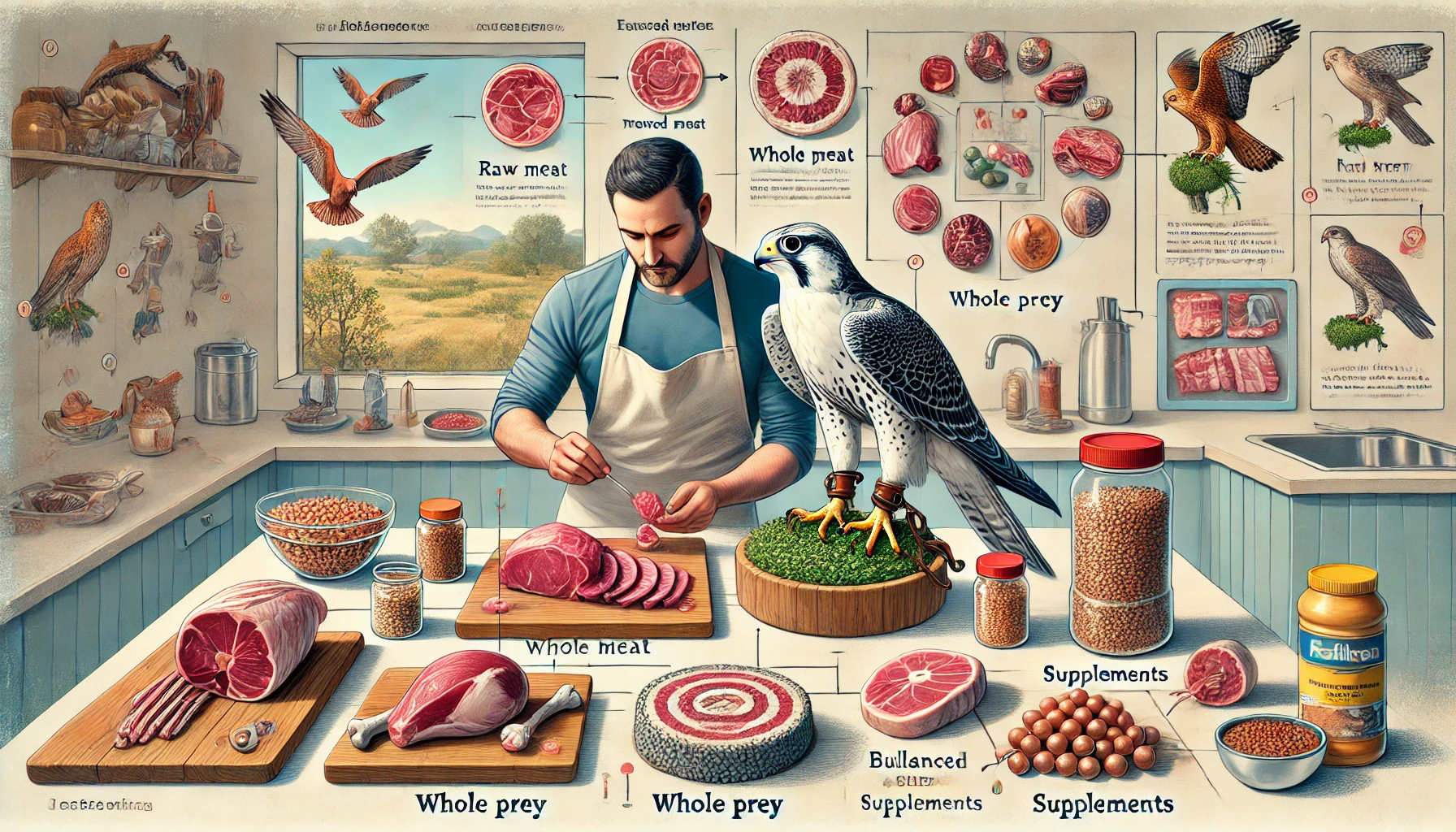Key Tips for a Balanced Diet
- A balanced diet includes a variety of foods from all food groups.
- Eating fruits and vegetables daily is essential.
- Choose whole grains over refined grains.
- Include lean protein sources like poultry, fish, beans, and nuts.
- Moderate your intake of dairy; opt for low-fat or fat-free options.
- Don’t forget to drink plenty of water throughout the day.
- Limit sugar, sodium, and unhealthy fats.
- Portion control helps maintain a healthy weight.
- Planning meals and snacks ahead can help you make healthier choices.
- Eating a balanced diet supports overall health and well-being.
Unleashing the Power of a Balanced Diet
Imagine you’re in the beautiful rolling green hills of Ireland. There, falconers train their majestic birds of prey to soar gracefully through the skies. To maintain such incredible skill and strength, these birds require a precise and balanced diet. Just like Ireland’s falcons, we too need a balanced diet to keep us energized, healthy, and ready to take on the day.
Creating a balanced diet isn’t just about eating vegetables or cutting out sweets; it’s about making sure we’re getting all the essential nutrients our bodies need. Think of it like creating a rich, colorful tapestry’each type of food adds a unique thread, weaving together to form a strong, resilient fabric.
In this article, we’ll explore the importance of a balanced diet and how it can lead to a healthier, happier life. We’ll break down the key components, share tips on making healthier choices, and explain why it’s worth sticking around to read more. So get comfortable, and let’s dive into the fascinating world of balanced diets, where a few simple changes can make a world of difference. Just like training a falcon, maintaining your diet can seem challenging at first, but with the right guidance, you’ll see just how rewarding it can be.
Creating a Balanced Falcon Diet
A balanced falcon diet is vital for the health and well-being of your bird. Ensuring your falcon gets the right nutrients helps maintain its energy levels, promotes healthy feathers, and supports its overall health. Let’s explore what an tbalanced falcon diet entails and the best practices to achieve optimal falcon nutrition balance.
Understanding Falcon Nutrition Balance
Falcons are carnivorous birds of prey that primarily feed on small mammals, birds, and insects. To provide a balanced falcon diet, it’s crucial to replicate their natural dietary habits as closely as possible. Key nutrients include:
- Proteins: Essential for muscle development and overall growth. Fresh, whole prey such as mice, quails, and day-old chicks are rich in proteins.
- Fats: Provide energy reserves and help maintain body temperature, especially in colder climates.
- Vitamins and Minerals: Vital for metabolic functions, immune support, and bone health. Natural prey items typically supply these nutrients, but supplements may be necessary.
For more detailed information on a falcon’s dietary needs, visit our Falcon Health and Nutrition.
Components of an Optimal Falcon Diet
To achieve an optimal falcon diet, consider these components:
- Variety of Prey: Feed your falcon a variety of prey to ensure it receives all necessary nutrients. Rotate between mice, rats, quails, and other game birds to avoid deficiencies.
- Supplementation: Occasionally, natural prey may not meet all nutritional needs. Vitamin and mineral supplements can help fill these gaps, especially during molting or breeding seasons.
- Hydration: Fresh water should always be available. Dehydration can lead to serious health issues. Some falcons prefer to drink after feeding, so provide water post-meal.
To understand more about basic nutrition and common health concerns in falcons, read our Basic Falcon Nutrition and Common Falcon Health Issues.
Best Practices for Feeding Falcons
- Daily Feeding: Establish a consistent feeding schedule. Falcons typically eat once a day, but this can vary depending on age and activity level.
- Prey Size: Tailor the prey size to your falcon’s size. For instance, a larger falcon like a Gyrfalcon might require larger prey compared to a smaller species like a Merlin Falcon.
- Handling Prey: Ensure prey items are fresh and clean. Avoid feeding spoiled or contaminated food.
For guidelines on handling and preparing food, visit Falcon Diet Planning and Advanced Falconry Techniques.
Monitoring and Adjusting the Diet
Regularly monitor your falcon’s health and adjust its diet as needed. Weight management is pivotal; a sudden loss or gain in weight can indicate dietary problems. Understand your falcon’s needs by keeping track of its weight, feather condition, and overall vitality. Learn more about weight management and seasonal care in our Weight Management for Falcons and Seasonal Care sections.
Feeding a falcon requires attention to detail and a commitment to meeting all its nutritional needs. By following these guidelines, you can ensure your falcon thrives on a well-balanced diet.
Explore more detailed aspects of falconry care, equipment, and training techniques on our website:
- History of Falconry
- Falconry Equipment
- Training a Falcon
- Species of Falcons
- Falconry Techniques
- Legal Aspects of Falconry
By adhering to these recommendations, you’ll be well on your way to mastering the nutritional balance necessary for maintaining a healthy, happy falcon.
Creating a Balanced Diet for Peregrine Falcons
Prey Diversity and Flexibility
Peregrine falcons have a varied and adaptable diet that is crucial for their survival in diverse environments. They primarily feed on birds, which make up 77% to 99% of their diet. Here’s a breakdown of their primary prey by biomass:
| Prey Type | Examples | % of Diet |
|---|---|---|
| Columbidae | Pigeons, Mourning Doves, Songbirds | Highest |
| Small Reptiles | Various species | Moderate |
| Mammals | Bats, Arvicoline Rodents, Squirrels, Rats | Lower |
During the 2020 lockdown in the UK, peregrine falcons had to change their diet due to the reduced availability of pigeons. However, they quickly adapted and by 2021 their pigeon consumption increased again. This flexibility is a testament to their ability to thrive despite changes in prey availability.
Nutritional Resilience
Despite these dietary changes, peregrine falcons maintain their reproduction rates. This is largely due to their broad and adaptable diet, which ensures they get the necessary nutrients from various sources. The adaptability of their diet is key to their survival in different environments.
Gut Microbiota and Health
The diet of peregrine falcons also plays a significant role in shaping their gut health. Their gut microbiota is enriched in Salmonella, which indicates how their dietary habits influence their microbiome. This aspect of their diet shows the interconnectedness between their food intake and overall health.
Conservation Impact
The diet of peregrine falcons is also closely linked to their conservation status. For instance, the banning of the pesticide DDT has played a significant role in the recovery of their populations. Conservation efforts targeted at protecting their natural prey and habitats are essential for ensuring their survival.
Optimal Diet in 2024
In 2024, the optimal diet for peregrine falcons includes a significant portion of birds, particularly those in the Columbidae family. Here’s an example of their typical diet composition:
| Year | Birds | Small Reptiles | Mammals |
|---|---|---|---|
| 2024 | 77-99% | Lower | Bats, Squirrels, Rats |
This adaptability and varied diet enable peregrine falcons to thrive in diverse environments, maintaining their health and reproductive success. The holistic approach to their diet ensures that they receive the essential nutrients they need.
Personalized Nutrition Coaching
Just as peregrine falcons require a balanced and adaptable diet, there’s a growing emphasis on personalized nutrition for human health. In 2024, services offering customized nutrition plans are becoming more popular, focusing on the unique needs and goals of individuals. This approach ensures a well-balanced diet and supports overall well-being.
| Key Elements | Falcon Diet | Human Nutrition |
|---|---|---|
| Diversity and Adaptability | Wide range of prey | Variety of foods |
By highlighting these elements, we understand the importance of a balanced diet for both animals and humans. This comprehensive approach to nutrition helps in achieving optimal health and resilience.
Why a Balanced Diet is Crucial for Falcons
Creating a balanced diet is essential for peregrine falcons to thrive. These magnificent birds have a diverse and flexible diet that includes starlings, pigeons, parakeets, small reptiles, and even mammals like bats and rodents. This variety ensures they receive all the necessary nutrients and helps them adapt to changes in their environment.
During times when certain prey is less available, such as during the lockdown in 2020, peregrine falcons have shown remarkable resilience by adjusting their diet. This flexibility has allowed them to maintain their health and reproduction rates even in changing conditions.
Additionally, the health of a falcon’s gut microbiota, enriched by their diverse diet, is crucial for their overall well-being. Conservation efforts, like the banning of harmful chemicals, have also played a key role in supporting healthy populations of these incredible birds.
To wrap it all up, a well-balanced diet doesn’t just benefit one aspect of a falcon’s life ‘ it’s essential for their survival and health in a world that’s always changing.
So, if you’re passionate about learning and caring for these majestic creatures, remember that providing a diverse and adaptable diet is one of the best ways to support their journey!



